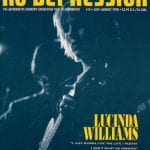Martin Zellar – Growin’ Up
Martin Zellar used to be the lead singer of the Gear Daddies, a Minneapolis-based garage band of rare vision and grace that released two albums in the late ’80s. The band’s emotional live shows — great rambling sets filled with alternately delicate and raging rock ‘n’ roll, and plenty of big, sincere emotions displayed right there on the singer’s sleeve — could break your heart, and then heal it, all before the third or fourth encore.
Zellar himself still refers to the band as “my first love,” and when critic Jim Walsh wrote the liner notes to a posthumous collection of Gear Daddies rarities titled Can’t Have Nothin’ Nice (Crackpot, 1992), he spoke for many fans when he predicted: “For as long as I live, I will never, ever love a band the way I love the Gear Daddies.”
Zellar’s solo career has been, in many ways, a struggle to come to terms with this past, to discover just what his new musical personality would be. On his third post-Gear Daddies album, The Many Moods Of Martin Zellar, you can sense almost from the first note that he’s finally figured it out. Where his initial solo efforts were solid albums spotted with great moments, Many Moods is engaging start to finish. Drawing upon everything from C&W and the blues and R&B to unabashed pop and dramatic rock ‘n’ roll, it’s the album that finally renders those old expectations irrelevant.
“I understand that the Gear Daddies were a great band,” he tells me over the phone from Minneapolis. “I loved that band as much as anybody, you know, but it’s definitely a that-was-then-this-is-now kind of thing. So I understand there’s a lot of baggage there — a lot of really positive baggage — but…we were young then, and they were songs that hit home when you’re younger. And I’m not young anymore.”
This metamorphosis from boy rocker to grown-up singer-songwriter is, of course, not unique to Zellar, but it’s definitely tough to negotiate. Some manage the shift gracefully and continue to produce vital music (say, Bruce Springsteen), while others (Paul Westerberg, perhaps) seem to lose something essential in the translation. Those who pull it off somehow learn to turn the angst of “Baby, we were born to run” into “I’ll make my stand right here.”
One way Zellar has chosen to make his stand was to leave Rykodisc, which issued his first two solo albums, and start his own label, Owen Lee Recordings (named for his youngest son), a move that allows him the time to nurture what matters most to him: his relationships with family and friends.
“My decision to leave was nothing specific to Rykodisc,” he explains, sounding grateful to be on his own. “I think it’s just the way the industry’s structured, period, and a lot of bands fall through the cracks, given the system, and I was one of them….It’s definitely structured so that you don’t really make your living selling CDs, unless you’re selling huge amounts. Which I don’t. And when I’m talking huge amounts, I know bands that have sold upwards of 200,000 and still haven’t hit break point. So, it basically puts the onus on the artist, and specifically his touring. If you want to make a living doing it, you have to tour.”
Consequently, when his second Rykodisc album was released, Zellar needed to hit the road for several months when what he wanted to do was be home. “I have a family, a wife and two sons, and they were definitely my number one priority,” he remembers. “And the whole [Ryko] arrangement just made that so hard to do….Now when I go out, it’ll be for just a few weeks at a time, and my oldest son Wilson is old enough now to actually talk with on the phone, which makes it easier too.
“So part of the reason behind doing Owen Lee is just that I can do it,” he continues. “I sell enough CDs, relative to most people I guess, and so I knew it wasn’t a risky business venture….Basically what it amounted to was being able to come up with the money…to record the album, press it, hire people to work the PR and radio — basically it comes down to loaning myself the money and then subcontracting the rest.
“The other thing I like about this is it gives me the freedom to release whatever I want of my own. For the first time, I can indulge myself creatively. Unless I want to spend a shitload of money recording it, I can sell 2,000 copies of something and get my money back. We’re even going to re-release [the Gear Daddies’ debut] Let’s Go Scare Al. This new setup is just so much a better fit for me.”




